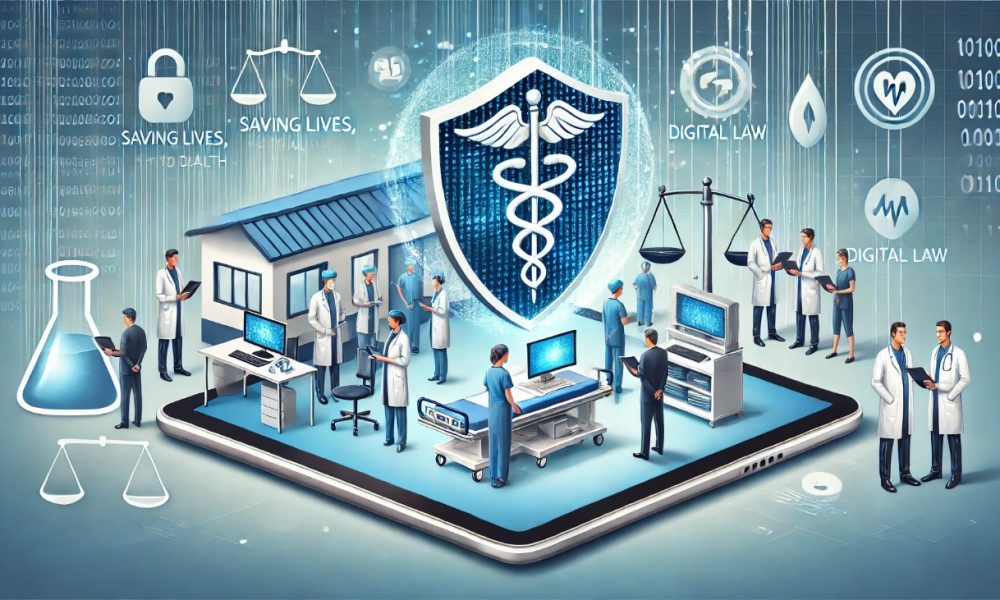In today’s rapidly evolving digital landscape, healthcare is experiencing a transformation like never before. From telemedicine and electronic health records (EHRs) to artificial intelligence (AI) in diagnostics and wearables that monitor vital signs, digital health technologies are revolutionizing patient care.
However, these advancements bring critical challenges concerning medical ethics and law. Issues such as patient privacy, informed consent, data security, and healthcare providers’ responsibilities are more significant than ever.
The Role of Medical Ethics in Digital Health
Medical Ethics in a Digital World
Medical ethics refers to the moral principles guiding healthcare. In digital health, these principles—autonomy, beneficence, non-maleficence, and justice—become increasingly complex.
One of the most pressing concerns is patient autonomy. Digital health tools must ensure patients are fully informed before consenting to treatment or sharing personal health data. But how do we guarantee understanding when technologies like AI complicate decision-making?
Case Study: Ethical Challenges in Telemedicine
A 2024 high-profile case involved a U.S. telemedicine company sued by a patient for misdiagnosing her condition. The lawsuit alleged that the patient needed to be informed about the limitations of AI used in virtual consultations. The system’s inability to perform thorough physical examinations led to an incorrect diagnosis, violating the principle of non-maleficence or “do no harm.”
This case underscores the ethical dilemma of relying on AI in healthcare without adequately communicating its limitations to patients.
Legal Frameworks Governing Digital Health
Existing Legal Protections
Countries have established laws to regulate digital health, but their implementation varies widely:
- HIPAA (U.S.): Ensures privacy and security for patient data.
- GDPR (EU): Provides stringent rules on data collection and consent.
These regulations demand that healthcare providers and technology developers prioritize patient data security and transparency.
Global Challenges in Legal Compliance
Digital health’s global reach complicates legal compliance. For example, while GDPR requires explicit consent for data use, other countries may lack such robust protections. This inconsistency can lead to data breaches or misuse of sensitive health information, particularly when services across international borders.
The Intersection of Ethics and Law in Digital Health
Alignment of Ethics and Law
Both ethics and law aim to protect patients, but they intersect differently:
- Ethics: Focuses on moral obligations.
- Law: Provides enforceable standards.
For example, informed consent in telemedicine is both an ethical necessity and a legal requirement under most healthcare regulations.
Ethical Gaps in Legal Frameworks
There are instances where ethics surpass legal obligations. A telemedicine provider may comply with laws but fail ethically if patients don’t fully understand AI’s limitations. Bridging this gap requires collaboration between ethicists, legal experts, and technology developers.
Ensuring Data Security and Privacy
Data Protection Laws and Best Practices
High-profile breaches, like the 2020 incident involving a telemedicine giant, reveal vulnerabilities in digital health systems. These breaches exposed the sensitive data of millions, highlighting the need for:
- End-to-end encryption
- Regular security audits
- Compliance with laws like HIPAA and GDPR
Healthcare providers must stay ahead of emerging threats to maintain trust and protect patient privacy.
Emerging Ethical Dilemmas in AI and Machine Learning
Algorithmic Bias
AI systems depend on data for training, but biases in these datasets can lead to disparities in care. For instance, an AI tool trained primarily on data from one demographic may provide inaccurate results for others, violating the ethical principle of justice.
Accountability in AI Errors
Who is liable when an AI tool makes a wrong diagnosis? Developers, healthcare providers, or patients? Legal systems worldwide are still grappling with this question.
Wearables and Health Data Ownership
Ethics of Data Collection
Wearables like fitness trackers and smartwatches collect personal health information. Users often consent without understanding how their data is used or shared.
Healthcare providers and developers must ensure transparent policies about data ownership and use. Patients should retain control over their health data, and companies must prioritize ethical data handling.
Telemedicine: Expanding Access While Ensuring Equity
Benefits for Underserved Communities
Telemedicine bridges gaps in healthcare access, particularly for rural and underserved populations. However, disparities remain, particularly for those lacking reliable internet access or digital literacy.
Ethical Responsibility to Ensure Equity
Healthcare providers must address the digital divide by advocating for policies that make digital health tools more accessible and affordable.
The Future of Medical Ethics and Law in Digital Health
Preparing for Tomorrow’s Challenges
As technologies evolve, so will ethical and legal challenges. Policymakers, technologists, and healthcare professionals must collaborate to create adaptive regulations that address emerging concerns like AI ethics, global compliance, and equity in access.
Charting the Ethical and Legal Roadmap for Digital Health
As digital health revolutionizes healthcare delivery, the importance of integrating robust medical ethics and comprehensive legal frameworks cannot be overstated. These dual pillars are vital for addressing challenges such as patient autonomy, data privacy, AI accountability, and equitable access.
The journey of digital health is as much about technological innovation as it is about safeguarding the human element in medicine. By prioritizing transparency, fairness, and patient-centric practices, we can ensure that digital health tools enhance medical outcomes and uphold the core principles of ethical and legal responsibility.
